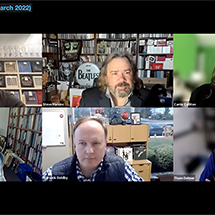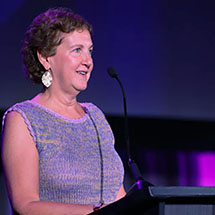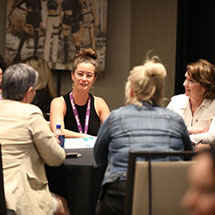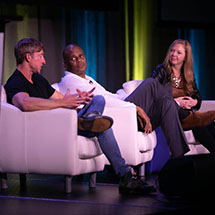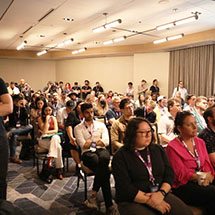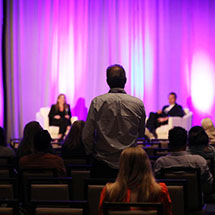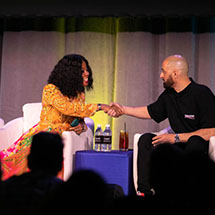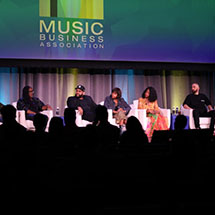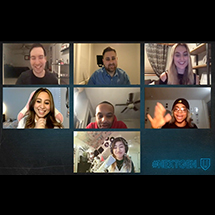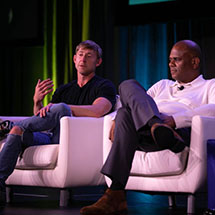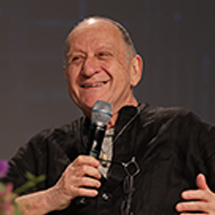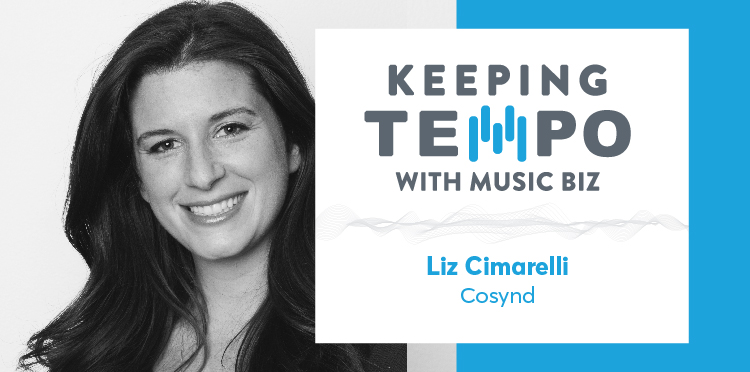
[Keeping Tempo With Music Biz] — Cosynd’s Liz Cimarelli Discusses The Current State of Music Copyright & Cosynd’s New Producer Copyright Initiative

While new creation tools are helping more and more people worldwide achieve their dream of recording & releasing music, existing methods for protecting one’s original work are not always attainable by independent artists. With almost ten years of experience securing copyrights for artists & rightsholders alike, Cosynd recently used its expertise to craft a solution for producers that allows them to register their beats with the U.S. Copyright Office in a cost-effective group registration bundle. In our latest Keeping Tempo interview, we sat down with Cosynd’s COO & Head of Business Development, Liz Cimarelli to discuss this latest initiative, how today’s tech & trends are redefining copyright protections in the modern age, and beyond!
Music Biz: Before we get into the specifics of Cosynd’s latest solution for the production community, can you share with us a little about the company’s origins and your evolution in the first near-decade you’ve existed?
Liz Cimarelli: We launched Cosynd with a powerful mission: to level the playing field by giving musicians, artists, writers and creatives the tools they need to protect and legally own their work, building towards a more equitable music industry.
At the start, we tackled copyright challenges head-on, developing a creator-first platform that simplified copyright registration and contract management. We wanted to make these essential tools accessible and affordable for all of their assets — including photos, illustrations, videos, literature and more — recognizing that creators are also entrepreneurs with diverse intellectual property needs. We worked closely with experts and lawyers to ensure our solutions were practical and met real-world demands.
Now, Cosynd is used by thousands of copyright creators and businesses across more than 160 countries. Our platform grew to serve not just individual creators but also law firms, labels, publishers, brands, and other rights administrators — including those performing due diligence for IP acquisitions. We expanded our services to include bulk catalog registrations, recordations for transfers of copyright ownership, copyright mortgages, and notices of termination, alongside automated workflows around legal document creation for all copyright owners. We also introduced a risk assessment tool that audits the catalog to identify the registered titles in the catalog while also calculating the cost to file the unregistered titles, ensuring their protection. Uncovering those registration gaps is becoming crucial as more companies pursue legal actions like class action suits, where copyright registration is now a prerequisite.
Some other major milestones for us were refining our technology to make copyright processes smoother, launching our copyright registration API and white label platform, and partnering with major distributors and industry organizations to reach more creators on a global scale, at the point of highest vulnerability — as they share their music with the world for the first time.
Music Biz: As outlined in our recent podcast with Cosynd CEO, Jessica Sobhraj, the company has just launched a new registration service specifically to meet the needs of music producers. What does this service offer, and what criteria do producers need to meet to use it?
LC: We are so thrilled about the launch of our new beat kit registration service. This service addresses a critical gap in the industry by offering producers an affordable way to register their music and take advantage of the protection a federal registration provides against bad actors using their work without permission, compensation, or credit — a longstanding challenge in the industry that is potentially at the root of the widespread infringement we see.
Until now, the standard method for producers and beat makers to protect their works was to register each beat individually, making it prohibitively expensive for them to safeguard their creations and take legal action against misuse or infringement. When a producer’s work is used without permission, the first instinct may be to approach the infringer amicably. However, a bad actor will often gauge their potential liability based on whether the work is registered with the Copyright Office. Copyright registration unlocks crucial legal benefits, such as the right to file a lawsuit and potential payouts of up to $150,000 per infringement plus legal fees if the work is registered before the infringement occurs. Given that registration can take several months to process, producers trying to rush registration to gain leverage in a dispute may find themselves paying twelve times the normal processing fee for expedited registration, with no guarantee of a successful payout.
With Cosynd’s beatkit registration service, a producer now can register up to 50 beats at once on one application, saving them a considerable amount of money and eliminating the guesswork and administrative burden of separating their catalog into various applications with the U.S. Copyright Office (USCO).
Any producer that currently has an existing beat kit, sample pack, sound kit or a collection of music and/or audio loops that have not yet been released or registered can take advantage of this new service.
Music Biz: As you are still in the early stages of rolling out this new service, what has the initial feedback from test clients been and what are your next steps as implementation of this tool matures?
LC: This has been a groundbreaking approach to beat registration, and our community partners are thrilled with the results. For a producer or beatmaker to now have the ability to legally enforce their rights with an official copyright registration is a game changer.
We will be launching the option for a producer to register their beat kits directly on our website soon, and have interest among a number of key players to implement our registration API to make registration possible at the point of distribution. One of the first partners to participate in this initiative is BeatStars, which recently launched the Creator Rights Agency, a platform that aims to help artists negotiate contracts and settle infringements.
These partnerships are essential to our business, especially for those in the production marketplace where producers create, collaborate, license and sell their beats. It’s crucial to protect these beats to secure the income from each release, and our partners recognize this as a priority. We’re always eager to collaborate with anyone committed to safeguarding the music and artists they work with, ultimately ensuring the financial security of their careers.
Music Biz: Your new initiative was born out of the trend of bad actors using unlicensed beats in their songs to skirt paying for proper samples — how prolific is this problem in today’s music industry?
LC: The prevalence of bad actors using unlicensed beats in songs to avoid paying for proper samples is a significant issue in today’s music industry, and truthfully always has been. It’s disheartening to note that a majority of infringement cases revolve around the unauthorized use or origins of a beat. These types of infringements are made easier with the accessibility of digital production tools and the vast online repository of beats and samples, which facilitate music creation without obtaining necessary licenses or permissions.
This practice not only undermines the hard work of legitimate creators but also leads to substantial financial losses for rightsholders. Until now, the standard method for producers and beat makers to protect their works was to register each beat individually, making it prohibitively expensive for them to safeguard their creations and take legal action against misuse or infringement. Unfortunately, producers have historically been presented with a significant economic hurdle when protecting their beats with copyright registration, which made it easy for bad actors to get away with using unlicensed beats in their songs.
Increasing awareness about the importance of copyright protection, coupled with accessible registration processes, is crucial in mitigating the increase of unlicensed beats in the future and fostering a more equitable music industry for all creators. Our goal has always been to make copyright protection accessible to everyone from newly aspiring beatmakers and trendsetters to hitmakers and legacy legends. With the launch of this new service, we are now empowering these creators and their teams to tackle these tasks more effectively to save them considerable time and money.
Music Biz: This situation brings up an interesting point of comparison: it seems that it’s easier than ever for someone to write and distribute a song, but the sheer rush of new material to review means the methods of protecting new songs have not reached the same level of attainability and convenience. Would you say that’s a fair assessment?
LC: Absolutely! While technology has empowered artists to create, collaborate and distribute their music globally with unprecedented ease, protecting that music is rarely given the priority that it deserves.
Part of the challenge stems from a lack of awareness and education among creators about the importance of proper contracts with collaborators and what copyright registration actually equips them with. These practices shield creators from the many myths and excuses that infringers have used to attempt to justify their actions. Some frequent misconceptions we hear regarding sampling is that you are legally allowed to sample short sections of audio without having to worry about infringing on another creator’s copyright. However, all music samples need to be cleared, regardless of their length.
Many creators also believe their work has been registered with the US because they are registered with a PRO. However while both USCO and PRO registration are necessary, these are completely different registrations that have completely different benefits for the creator. Those that do understand the benefits of copyright registration, have seen it as an expensive, complex and daunting process and therefore, may not have done it at all. The truth is that establishing clear ownership with agreements and registering with the USCO is one of the most important tasks a creator should take if they plan to sell, license or release that work in any way.
Music Biz: Companies like Cosynd specialize in services that make registering with the USCOe easier and more affordable for a wider swath of artists. To that end, how is the Copyright Office evolving its own services to best serve rightsholders?
LC: With so many new technologies and digital media features influencing how music makers create, distribute and consume content, the Copyright Office is always seeking input from the creative community to better service copyright owners in today’s ever-evolving landscape. This collaborative approach allows them to anticipate and address emerging challenges, such as the integration of artificial intelligence in creative processes.
One of the recent developments we’ve been praising is the Copyright Office’s Copyright Claims Board (CCB), a voluntary, alternative forum to the federal courts. Launched under the CASE Act (Copyright Alternative in Small-Claims Enforcement Act), the CCB provides a simpler and more accessible way for creators to resolve copyright disputes involving claims seeking damages of up to $15,000 per work and $30,000 per case. This system is designed to be less expensive and faster than federal court proceedings, the average cost of which is roughly $200,000. The CCB is accessible to anyone, with or without an attorney, and all proceedings are conducted remotely. The streamlined procedures make the process straightforward, and participation is completely voluntary. Additionally, the filing fees are incredibly affordable, making it possible for anyone, regardless of budget, to pursue their claims.
However, we do like to remind creators that, before the CCB makes a determination in any infringement dispute, they must complete the USCO registration process for the work at issue.
Music Biz: As outlined above, access to tools for creation may be prolific, but do you feel as if access to education about proper copyright protection is reaching the same audience of potential artists?
LC: It’s essential to recognize that while the focus often lies on monetization and creation, education about copyright protection is equally — if not more — crucial. Some of the most costly mistakes artists can make revolve around the mishandling of their intellectual property rights.
At Cosynd, we make every effort to communicate with our partners about the importance of understanding and safeguarding their creative works, as well as offer their communities access to affordable & efficient copyright protection. By providing accessible and comprehensive educational resources on copyright protection, we aim to empower artists to navigate the complexities of the music industry with confidence.
Music Biz: Expanding on that, can you give your perspective to any artists or rightsholders reading as to why registering with the Copyright Office remains important in 2024?
LC: As we embrace the incredible opportunities enabled by new technologies for creating, distributing and consuming content, it’s crucial to acknowledge the accompanying risks. The ease of access and sharing also opens doors for bad actors who might steal, sample unlicensed beats, or falsely claim ownership of music to collect royalties.
Registering one’s work with the USCO remains vital for several reasons: First and foremost, it establishes a public record of ownership, providing indisputable evidence of their rights as creators. This proof can be invaluable in disputes or legal actions, safeguarding their work from infringement or unauthorized use. Moreover, copyright registration unlocks important legal benefits. Copyright registration is now mandatory before filing a lawsuit.
A common misconception is that many people/companies think that you can quickly register something if and when you need to. However, in reality, the registration process can take months to get approval, and expediting a registration comes with a hefty price tag (over ten times the standard federal filing fees).
Our advice to creators who upload their music to sell or license on a marketplace is that they should highly prioritize protecting that content BEFORE an infringement occurs. Having that registration in hand will allow the ability to threaten or pursue legal action if necessary, entitling the creator to $150,000 per infringement if registered before the issue occurred. While it may not be possible to register everything at once, it is prudent to start with the most valuable works and to create a schedule for tackling the rest.
For businesses purchasing or selling catalogs, it’s becoming common practice for buyers and insurers to require that the catalog be entirely registered, which could potentially kill an entire deal based on the length of time it would take to register thousands of songs.
Opting into a class action lawsuit will also require an approved copyright registration. We’ve seen many instances where rightsholders have missed the opportunity to participate because they prioritized registration too late.
Ultimately, copyright registration is not just a formality — it’s a strategic step to protect your creative assets and assert your rights as an artist or rightsholder in an increasingly complex and digital landscape.
Music Biz: AI technology is top-of-mind for the entire global music business at this moment. What potential benefits and threats does this tech suite pose specifically to the area of music copyright?
LC: On the positive side, AI offers several benefits for music copyright management. One notable advantage is its ability to streamline the identification and management of copyrighted material. AI-powered content recognition systems can efficiently scan vast libraries of music to identify instances of copyright infringement, helping rightsholders enforce their intellectual property rights more effectively. We’re eager to see more companies making this tech accessible for creators at all levels.
AI is now also being used to analyze user preferences and consumption patterns that will help optimize content marketing, distribution, promotional campaigns, and licensing strategies that can reach more potential fans more efficiently and maximize revenue.
We’re also excited to see innovative initiatives that are reshaping collaboration and ownership dynamics in this environment, such as Grimes’ Elf.Tech web3 project which allows other musicians to utilize Grimes’ voice in their creations, provided they split royalties with her. This approach not only fosters creativity but also ensures equitable collaboration, demonstrating a novel approach to ownership in the music industry.
Despite the benefits, a looming concern is the potential for AI-generated content to blur the lines of ownership and authorship, especially when creators are incorporating AI tools in their creative process. While the USCO does not currently recognize works solely generated by AI for copyright registration, legislative efforts are underway mandating AI companies to disclose copyrighted content used in training generative AI models. This move promotes transparency and safeguards creators’ rights and protects overall creativity. Schiff emphasizes the need to balance AI’s potential with ethical guidelines, ensuring creators are informed about their work’s use in AI training.
As we navigate the impact of AI in the music industry, it’s clear that fostering collaboration among stakeholders and crafting thoughtful policies is crucial for safeguarding the integrity and protection of music copyrights. These initiatives resonate deeply with us as we strive to ensure artists’ rights are upheld amidst AI advancements. Notably, the ELVIS Act, recently signed into law by Tennessee Governor Bill Lee, stands out for its focus on preserving artists’ core elements of identity — voices, lyrics and likenesses. Additionally, we’re closely following bipartisan efforts like the No AI FRAUD Act and the draft No FAKES Act, which aim to establish federal rights of publicity. These legislative developments underscore the need to protect individuals from the misappropriation of their likeness by generative AI.
Achieving a balanced approach where AI serves the music industry positively while honoring the creativity and passion of human artists is essential. The human touch, characterized by artistic taste and knowledge learned through lived experiences, remains indispensable for delivering rich musical experiences and upholding ethical standards in copyright protection within the digital landscape.
Music Biz: Looking to the future, what are the main opportunities and challenges you see arising in the music copyright space in the next year or so?
LC: Looking ahead, one significant opportunity lies in the increasing awareness among creators about the importance of protecting their intellectual property rights, across their various brand assets. As platforms like ours make copyright registration more accessible and straightforward, we anticipate a surge of artists registering their works with the U.S. Copyright Office. This proactive approach not only safeguards their creations, but also unlocks potential revenue streams and legal protections.
Simultaneously, the music industry faces challenges stemming from the proliferation of content recognition systems designed to identify instances of copyright infringement. While these systems enhance detection capabilities, they also raise complex issues around fair use and automated takedown procedures. Balancing copyright enforcement with the need to foster creativity and innovation remains a critical challenge.
We also can’t ignore the growing interest in class action lawsuits against major infringers, signifying a shift towards collective action by rightsholders to combat widespread copyright violations. This trend underscores the importance of robust copyright protection frameworks and mechanisms that empower creators to assert their rights effectively.
In the next year, the convergence of these trends may further emphasize the necessity for comprehensive copyright strategies. From leveraging technology for registration and enforcement to advocating for fair compensation and navigating evolving legal landscapes, rightsholders will need to stay vigilant & adaptable to maximize opportunities and address challenges in the dynamic music copyright space.
You can read past “Keeping Tempo” articles via the portal linked here. And, stay tuned for more insightful discussions from our members and partners from across the industry!

